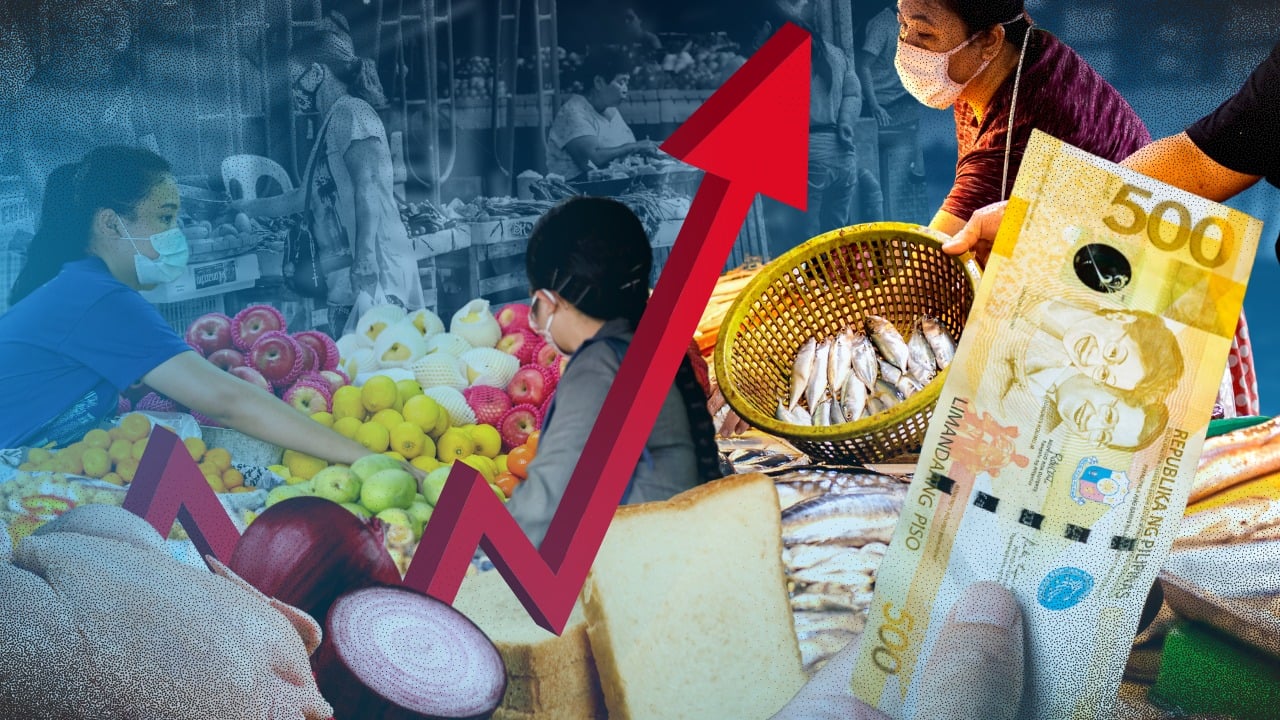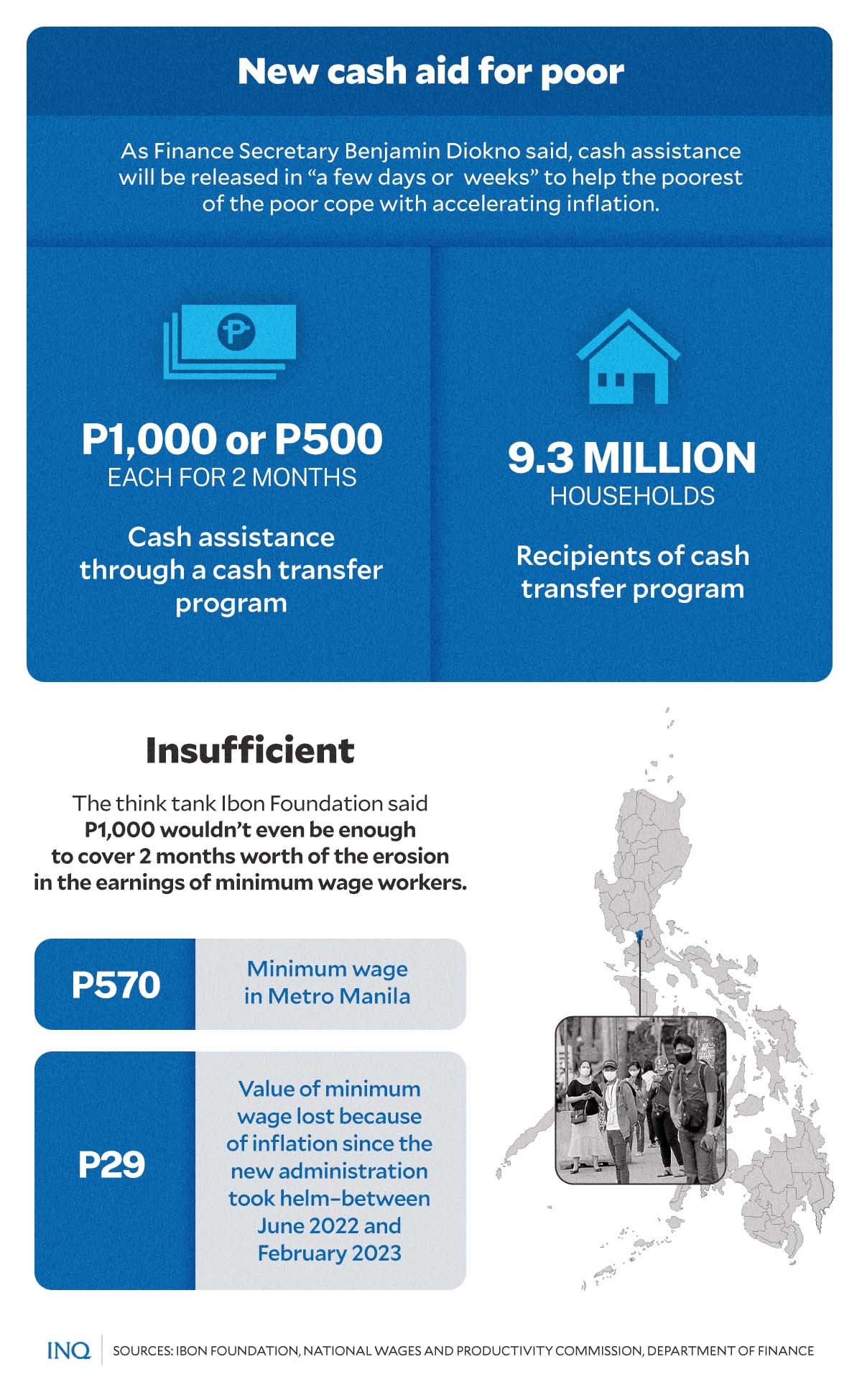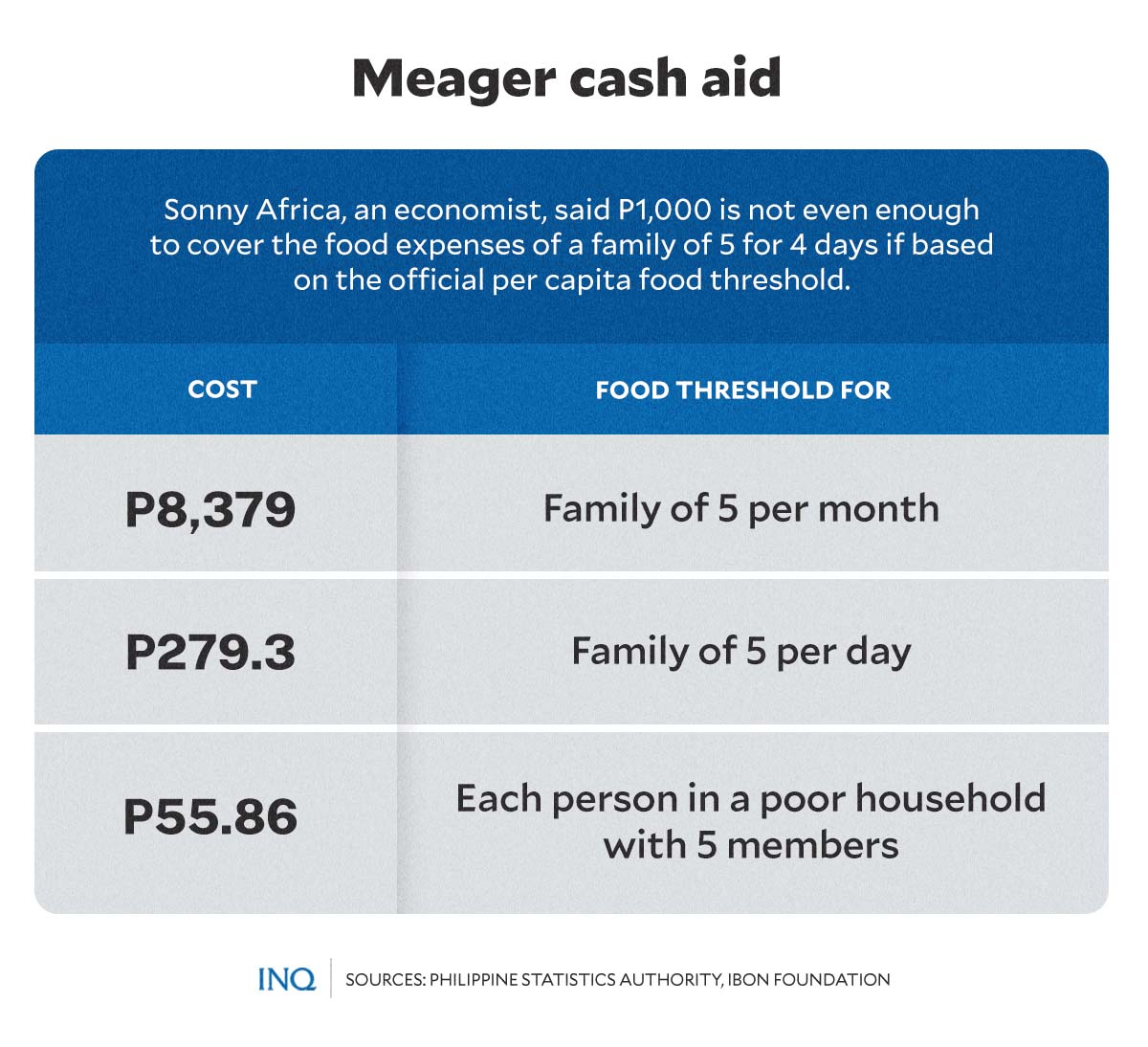Though ‘better than nothing,’ P1,000 ‘ayuda’ seen insufficient

COMPOSITE IMAGE BY JEROME CRISTOBAL FROM INQ FILE/STOCK PHOTOS
MANILA, Philippines—The P1,000 that the government will provide to millions of poorest households is “better than nothing but won’t give much relief.”
Sonny Africa, executive director of the think tank Ibon Foundation, said this on Thursday (March 9), as 9.3 million households are set to receive P500 each for two months.
As Finance Secretary Benjamin Diokno said, a cash assistance of P1,000, which will be divided for two months, will be released in “a few days or weeks” to help the poorest of the poor cope with accelerating inflation.
Diokno said aside from the cash assistance, the government will also provide subsidies like fertilizer, fuel discount for farmers and fisherfolk, and fuel subsidy for drivers: “A total of “26.6 billion…These will all be subsidies for the vulnerable sectors.”
READ: P26.6B in subsidies for vulnerable sector allotted amid high inflation —DOF

GRAPHIC Ed Lustan
According to data from the Philippine Statistics Authority (PSA), inflation in the Philippines only slightly decelerated to 8.6 percent in February from 8.7 percent in January after a relentless rise for five straight months.
The government has already identified funding for the ayuda program—P7 billion from “unreconciled” funds from the cash transfer program in 2021 while P2 billion will come from the contingency funds of the Office of the President.
RELATED STORY: Gov’t ramps up measures to tackle high inflation
However, Africa, an economist, said the “small amount helps so little and is targeted to help so few,” stressing that after a year of accelerating inflation and lack of decent paying work, millions of poor families have been needing help for so long.
Not enough to cover eroded income
He told INQUIRER.net that for instance, minimum wage earners in Metro Manila have already seen their P570 minimum income, which is the highest in the Philippines, lose P29 in value because of inflation since June 2022.
“The P1,000 wouldn’t even be enough to cover two months worth of the erosion in their earnings,” he said. “Yet most of those getting targeted cash transfer (TCT) will likely not even be minimum wage earners and will instead be in even more desperate circumstances.”
“The ayuda is only meant for the country’s poorest 9.3 million families which means families with monthly incomes of P15,000 at most, with the majority earning even much less than this.”

GRAPHIC Ed Lustan
Last year, the Partido Manggagawa said “many workers, many of them women, are paid even less than the minimum [wage],” pointing out that in Metro Manila, there are 1 million minimum wage earners but 800,000 workers are paid below the minimum.
Its secretary general Judy Miranda, citing data from the PSA, said the picture is even worse nationwide, with 2.4 million minimum wage workers and 8 million workers paid below the minimum.
Limited help
As Diokno said, “it is important to continue the subsidies being given to those in need because of high inflation,” stressing that to really tackle the high readout, “a whole-of-government approach is needed.”
However, a closer look, Africa said, would show that the P1,000 is not even enough to bring back poor households to where they were at the start of 2022, when inflation started accelerating.
The readout was 3 percent in February, 4 percent in March, 4.9 percent in April, 5.4 percent in May, 6.1 percent in June, 6.4 percent in July, 6.3 percent in August, 6.9 percent in September, 7.7 percent in October, 8 percent in November, and 8.1 percent in December.
The P1,000, Africa said, is “not even enough to cover the food expenses of a family of five for four days.”
According to data from the PSA, the food threshold for a family of five in 2021 was P8,379 a month, so for 30 days, it is P279.3 a day—P55.86 a day for each person, or P18.62 per meal.
READ: PH poverty: You’re not poor if you spend more than P18.62 per meal
‘Deceitful’
Africa said “the administration is also being deceitful in making it appear that the P1,000 is prompted out of concern for the impact of sustained high inflation.”
He stressed that “this amount is actually the balance of P1,000 that the government still owes the poorest 9.2 million families after abruptly canceling the TCT program last year.”
Ibon Foundation previously said Filipinos had been deprived of much-needed assistance and wage hikes that would have increased their purchasing power aside from boosting spending and economic recovery.
This, as the government only distributed P18.3 billion in targeted cash transfers (TCT) out of the P37.2 billion budgeted and, based on the memorandum, meant only 12.4 million households will receive P3,000 each.
However, as the program concluded with the last payout earlier this year, the think tank said the government only gave P2,000 each to 9.2 million families, indicating that less than three-fourths of beneficiaries received just two-thirds of the already “paltry” amount promised.
“Ending the program meant that Php18.9 billion in promised TCTs was unreleased. Giving P1,000 to 9.2 million only uses up Php9.7 billion of that unused budget (cash transfer plus administrative expenses) meaning over Php9.6 billion still to spare.”
Africa said “the misrepresentation of the P1,000 as a new ayuda is made worse by huge ayuda cuts in the 2023 budget.”
This, as there is a P11 billion cut in emergency assistance for distressed families, informal workers and overseas Filipino workers. “Even the 4Ps budget was cut by P5.1B,” he said.